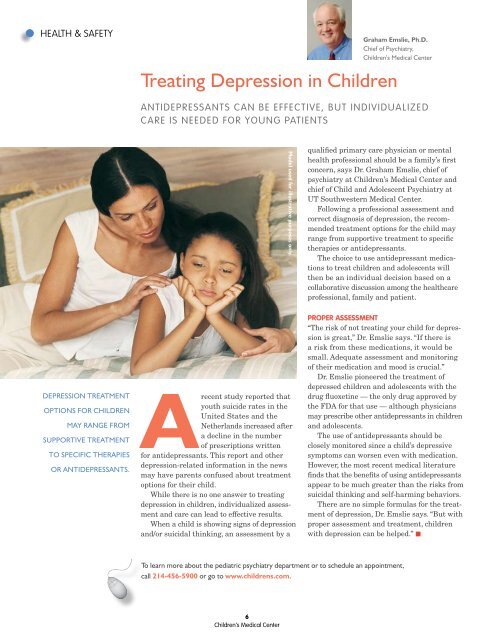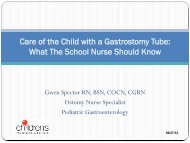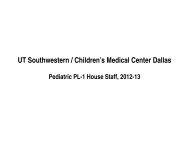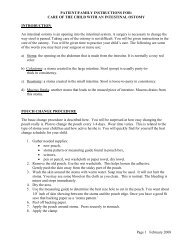NIGhtmAReS vS. SleeP teRRoRS cAR SeAt SAfety SPoRtS ...
NIGhtmAReS vS. SleeP teRRoRS cAR SeAt SAfety SPoRtS ...
NIGhtmAReS vS. SleeP teRRoRS cAR SeAt SAfety SPoRtS ...
You also want an ePaper? Increase the reach of your titles
YUMPU automatically turns print PDFs into web optimized ePapers that Google loves.
HealtH & Safety<br />
DepreSSioN TreaTMeNT<br />
opTioNS for chilDreN<br />
May raNGe froM<br />
SupporTive TreaTMeNT<br />
To Specific TherapieS<br />
or aNTiDepreSSaNTS.<br />
Treating Depression in children<br />
A<br />
recent study reported that<br />
youth suicide rates in the<br />
United States and the<br />
Netherlands increased after<br />
a decline in the number<br />
of prescriptions written<br />
for antidepressants. This report and other<br />
depression-related information in the news<br />
may have parents confused about treatment<br />
options for their child.<br />
While there is no one answer to treating<br />
depression in children, individualized assessment<br />
and care can lead to effective results.<br />
When a child is showing signs of depression<br />
and/or suicidal thinking, an assessment by a<br />
6<br />
Children’s Medical Center<br />
qualified primary care physician or mental<br />
health professional should be a family’s first<br />
concern, says Dr. Graham Emslie, chief of<br />
psychiatry at Children’s Medical Center and<br />
chief of Child and Adolescent Psychiatry at<br />
UT Southwestern Medical Center.<br />
Following a professional assessment and<br />
correct diagnosis of depression, the recommended<br />
treatment options for the child may<br />
range from supportive treatment to specific<br />
therapies or antidepressants.<br />
The choice to use antidepressant medications<br />
to treat children and adolescents will<br />
then be an individual decision based on a<br />
collaborative discussion among the healthcare<br />
professional, family and patient.<br />
proper assessment<br />
“The risk of not treating your child for depression<br />
is great,” Dr. Emslie says. “If there is<br />
a risk from these medications, it would be<br />
small. Adequate assessment and monitoring<br />
of their medication and mood is crucial.”<br />
Dr. Emslie pioneered the treatment of<br />
depressed children and adolescents with the<br />
drug fluoxetine — the only drug approved by<br />
the FDA for that use — although physicians<br />
may prescribe other antidepressants in children<br />
and adolescents.<br />
The use of antidepressants should be<br />
closely monitored since a child’s depressive<br />
symptoms can worsen even with medication.<br />
However, the most recent medical literature<br />
finds that the benefits of using antidepressants<br />
appear to be much greater than the risks from<br />
suicidal thinking and self-harming behaviors.<br />
There are no simple formulas for the treatment<br />
of depression, Dr. Emslie says. “But with<br />
proper assessment and treatment, children<br />
with depression can be helped.” n<br />
To learn more about the pediatric psychiatry department or to schedule an appointment,<br />
call 214-456-5900 or go to www.childrens.com.<br />
model used for illustrative purposes only.<br />
Graham emslie, Ph.D.<br />
chief of psychiatry,<br />
children’s Medical center<br />
aNtidepressaNts CaN Be effeCtive, BUt iNdividUalized<br />
Care is Needed for yoUNg patieNts








